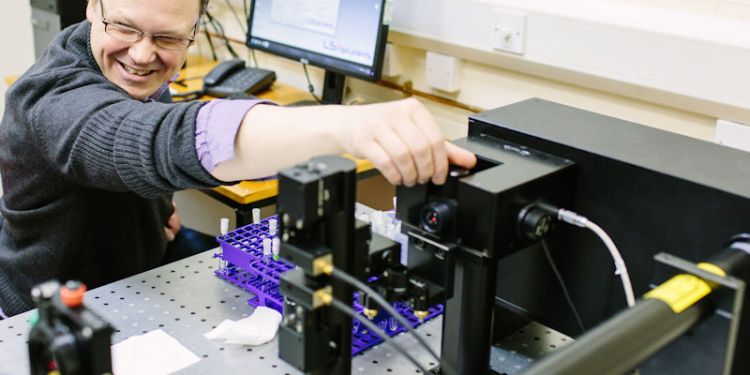Condensed Matter
Overview

We focus on experimental work centred on spintronics. In particular, we fabricate nanostructures from a variety of materials and investigate their properties as a function of structure, temperature, and magnetic field.
We are particularly interested in electron transport in novel structures and materials. One of our strengths is our ability to fabricate a wide range of structures, including spin-valves, tunnel junctions, ferromagnet/superconductor junctions, and quantum point contacts for Andreev scattering. Structures are produced using, for example, shadow masks, MBE for self-organisation, lithography, templates, and FIB processing. We characterise these structures using neutron and X-ray scattering, AFM/STM, and magnetometry.
Our research
Magnetism and magnetic nanostructures
There is an extensive programme of work on magnetic materials in ultrathin film form, and we are exploring other methods of nanostructuring these materials to make interesting devices. We have a substantial body of work on spin-valves and giant magnetoresistance, and this has led naturally to research on other spintronic devices that involve tunnel junctions and spin injection into semiconductors. We also work on the magnetic properties of the devices' various parts, including magnetically biasing the reference layers, the polarisation presented at an interface by a magnetic layer and its dependence on material parameters such as roughness and intermixing.
Carbon-based spintronics
Our research on carbon materials focuses on carbon nanotubes and graphene. Carbon exists in many allotropic forms, but these two materials provide naturally occurring examples of low dimensionality combined with high crystalline purity, allowing access to several exotic quantum phenomena. As components in the types of device used in spintronics research, carbon nanotubes and graphene both offer long spin coherence times, meaning that information encoded using the spin on an electron can be retrieved from a device following processing. The lack of scattering in carbon nanotubes also makes them viable components in more advanced quantum information devices, where electrons are entangled. We fabricate nanoscale devices to access these quantum phenomena.
Spintronics for quantum information processing
One of the long-term directions that spintronics can grow in is quantum information, as electron spins are canonical two-level quantum systems that are promising candidates for scalable qubits in a solid-state architecture. Many aspects of quantum information condensed matter physics can address: coherence, entanglement, fabrication of nanoscale elements and the communication between them, to name but a few. Many proposed schemes have in common the fabrication of nanostructures and communication links that incorporate a method of quantum control. We are exploring the application of spintronics and novel materials, such as CNTs or graphene, to quantum information. Spintronics experiments require a high degree of sophistication in materials growth, nanoscale fabrication and sample characterisation.
Links with industry
We have a broad research portfolio that has the potential to be exploited in commercial applications. We provide opportunities for collaborative research and development and access to the world-class facilities and expertise available within the group. We specialise in the deposition and characterisation of thin-film coatings and their subsequent patterning into nanoscale structures for device application. We provide a tailored material growth service, including the design, fabrication and analysis of thin films and devices and access to an extensive range of characterisation equipment. We welcome applications for collaborative research and development projects and can provide access to external funding.
Fellowship opportunities
The Condensed Matter group will welcome and support fellowship applications to external funders in areas that complement and enhance current research activities, in particular, antiferromagnetic/altermagnetic spintronics, ultrafast (microwave/THz) magnetism, and ab initio calculations of the electronic structure of relevant materials.
Further information
View all members of our research group and publications.
Visit our condensed matter research group website.
PhD projects
Find out more about our opportunities for prospective postgraduate researchers.
Contact us
If you are interested in collaborating with us or joining our research team, please contact a relevant member of staff.

